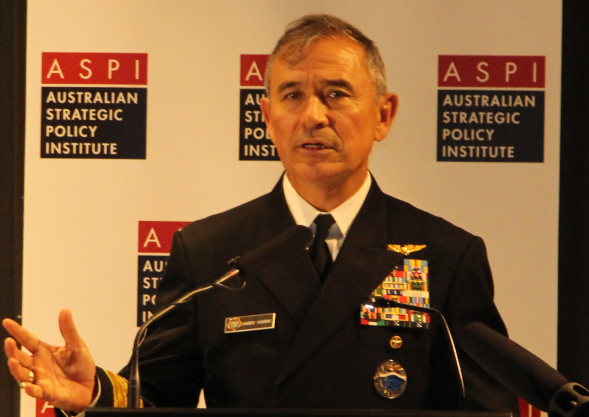
The White House announcement that Admiral Harry B. Harris, the current commander of the US Pacific Command, is President Donald Trump’s choice for ambassador to Australia is unambiguously good news for our alliance relationship. The posting sends the clearest possible signal that the US is intent on strengthening its Asian alliances. Europeans may still puzzle over Trump’s disaffection with NATO, but there should be no doubt that the White House sees America’s alliances in Asia as critical to sustaining an increasingly challenged strategic balance.
Predictably enough, America’s chorus of critics in Australia will seamlessly switch from agonising about Trump’s anticipated withdrawal from Asia to fretting that the president is too closely engaged. Could this White House get credit for anything from the Australian commentariat?
The
White House media statement on Harris’s nomination for the post describes him as follows:
A highly decorated, combat proven Naval officer with extensive knowledge, leadership and geo-political expertise in the Indo-Pacific region, he graduated from the US Naval Academy in 1978 and was designated a naval flight officer in 1979. He earned a MPA from Harvard’s Kennedy School of Government, a MA from Georgetown’s School of Foreign Service, and attended Oxford University. During his 39-year career, he served in every geographic combatant command and has held seven command assignments.
None of this is hyperbole. The American military has an amazing capacity for producing warrior scholars among its senior leadership—people who think deeply about strategy and international affairs and who aren’t afraid of the instruments of military power that make America the force it is in global affairs. Harris is precisely that kind of strategic thinker. These qualities were clearly on display in the three speeches he delivered at ASPI gatherings. The admiral’s strategic nous is leavened with a self-deprecating sense of humour that works well with Australians. Harry ended a
speech he delivered to an ASPI meeting in Brisbane with the line ‘fate rarely calls upon us at a moment of our choosing’ but then admitted the phrase came from the latest Transformers movie. ‘So if you remember nothing else, just remember that you were at ASPI the day when the PACOM Commander stole a line from Optimus Prime.’ Nice one, Admiral!
Australian media commentary has focused on Harris’s blunt language on China. His use at a 2015 ASPI conference of the term ‘great wall of sand’ to describe Chinese island construction in the South China Sea received international media attention at the time and was not appreciated in Beijing. It’s hard to fault the admiral’s assessment. During the height of China’s island construction in 2015 and 2016, the Obama administration spectacularly underestimated the significance of what was happening. Washington dismissed the South China Sea story as just spats over
obscure rocks and shoals. Harris was one of the few voices raised to say that the US should be more concerned about Beijing’s construction of military facilities able to control the air and sea space over a region vital to East Asian stability. What a pity Obama didn’t listen. It’s largely ‘game over’ in the South China Sea now, although it remains to be seen when the PLA will demonstrate its newly established reach into an area 80% the size of the Mediterranean, lapping Indonesia’s northern coast.
American ambassadors are typically loath to inject themselves into Australian domestic debates, but one should hope that Harris will help inject a bit of spine into discussions on national security. We should be concerned with the way our public debate is being shaped. Every issue—from Harris’s nomination, to new espionage legislation, to changes in foreign investment decision-making—is now assessed from the perspective of how Beijing will react. Our media gleefully reports criticisms of Australia in the ranting
Global Times or the more staid
People’s Daily as though the approval of Chinese journalists is the best measure of good Australian policy. Ministers trip over each other as they struggle with talking points designed to say that China isn’t the biggest strategic elephant in the room. The rules-based global order is just taking a little nap, folks, or perhaps pining for the fjords; nothing to worry about here.
What’s really needed is an Australian conversation, shared with our closest friends and allies, about the rapidly eroding strategic outlook in the Asia–Pacific region. North Korea is the immediate problem—now on a brief pause while we pretend that the Winter Olympics has the power to unite the peninsula. Beyond the Korean problem, which for good or ill will be the major focus of 2018, is a China that is rejecting the rules-based global order, building a massive military capability and looking to dominate its neighbours. China wins if we prove incapable of even having a realistic conversation about what this means for Australian security.
Back to Harry B. Harris. As ambassador, his plain speaking may, publicly, take a more diplomatic approach. But he will have a direct line to Trump and, presumably, to Turnbull. Goodness knows the alliance needs an injection of fresh thinking and a willingness to tackle the realities of our worsening strategic outlook. Full marks to Chargé James Caruso and the embassy staff for ably running the mission, but we should hope that the admiral’s Senate confirmation is quick and that Canberra will soon welcome an ambassador uniquely able to help grow the alliance and to develop shared responses to the crumbling rules-based order.
 Print This Post
Print This Post